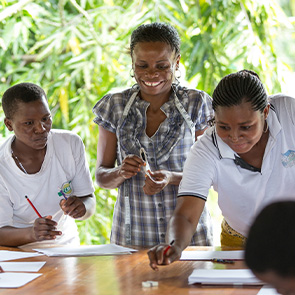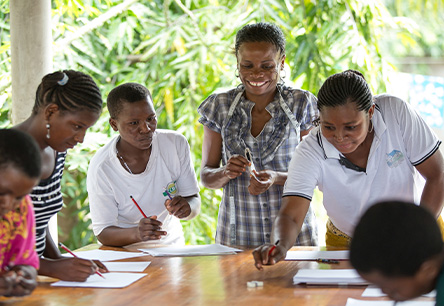Guided by Our Credo values, we respect and promote human rights across our operations, through our business relationships and in the communities in which we operate.
Focus Areas
In line with the UNGPs, we focus our efforts in areas where the potential and actual risk of adverse human rights impacts linked to our business is most significant. In 2022, we established a four-pillar framework to guide our human rights priority focus areas and related action plans.
Fair Working Conditions
Ensuring fair working conditions for Johnson & Johnson employees and engaging our suppliers to do the same across our supply base
Access to Healthcare
Advancing sustainable and equitable access to medicines and medical solutions that save and improve lives, cure patients and prevent disease for those in need
Safe, Effective Products
Providing patients, consumers and healthcare providers with products that are as effective and safe as possible at every stage of product development, manufacturing, supply chain and commercialization
Sustainable Environment
Improving the environmental footprint of our operations, our products and value chain, while also integrating human rights considerations into our environmental policies and programs
Governance
Johnson & Johnson’s Enterprise Human Rights Governance Council (EHRGC), established in 2019, is comprised of a cross-functional group of senior leaders representing key functions and oversees the Company’s approach to human rights, including setting priority focus areas and implementing action plans on an annual basis. The EHRGC is supported with direction and guidance from our Chief Sustainability Officer and our Worldwide Vice President of Legal Strategy Operations and Risk Management.
The Regulatory Compliance & Sustainability Committee (RCSC) of the Board of Directors provides oversight of management’s approach to respecting human rights. In 2022, the RCSC received an update outlining the continued evolution of the Company’s approach to human rights and external regulatory and stakeholder developments.
Improving human rights due diligence
We continually evolve and strengthen our broad-based human rights due diligence process. In 2022, we worked with ERM, an independent sustainability consultancy, to develop a risk identification tool to better identify geographies and sites at a potentially higher risk of adverse human rights impacts within Johnson & Johnson’s own operations and facilities. The tool will be deployed in 2023 to prioritize targeted due diligence reviews. In our supply base, we continued to assess human rights risks in our supply chain through the use of tools such as EcoVadis self-assessments from suppliers in our SSP and supplier audits. We also updated our Responsibility Standards for Suppliers (RSS), which strengthened guidance on how suppliers should establish policies and management systems to identify and address human rights impacts, and we provided training for suppliers on the RSS updates (see section: Supplier Engagement).
We prohibit the use of any forced or bonded labor in the manufacture of any product, or any component of a product, as outlined in our Anti-Human Trafficking Policy and Employment of Young Persons Policy. In 2022, we established an Anti-Modern Slavery work stream to advance our due diligence efforts in this area. We worked with Impactt—a consulting firm specializing in ethical trade and human rights—to support us in developing a suite of modern slavery due diligence materials such as training materials, a supplier assessment questionnaire and investigation guidelines. We also integrated Verisk Maplecroft risk indicators on Modern Slavery into our Supplier Risk Management system to identify potentially higher-risk suppliers. This work will inform further due diligence in 2023.
Rosey Hurst
Founder and Commercial Director, Impactt
Maintaining a living wage
In line with our commitment to fair working conditions, we continued in 2022 to implement an annual living wage assessment in collaboration with Business for Social Responsibility (BSR) to ensure employees in all the countries in which we operate receive pay that is both market competitive and sufficient to attain a sustainable standard of living. As in previous years, we made a small number of wage adjustments in countries to ensure our living wage standards were met.
Capability building
All Johnson & Johnson employees and certain categories of contingent workers are assigned and required to complete the Code of Business Conduct training, available in 27 languages, every two years. This training includes guidance related to human rights. Furthermore, our Foundational Human Rights Learning and Education course is available to all employees globally. At the end of 2022, more than 3,400 employees and contingent workers key to our human rights program had completed the module.
In 2022, 93% of Johnson & Johnson Procurement employees completed mandatory human rights training.
Collaborating to advance human rights
We continue to participate in various external platforms to share insights and good practices across industry, including Shift’s Business Learning Program, BSR’s Human Rights Working Group and the Pharmaceutical Supply Chain Initiative Human Rights and Labor Working Group.








